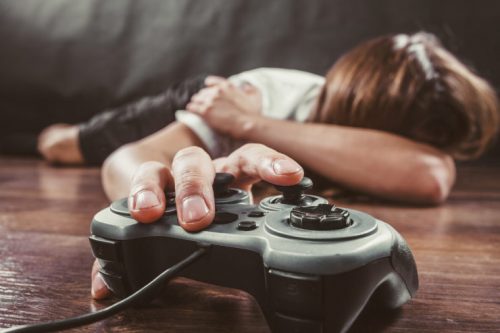
Source: addictionrecoveryebulletin.org
Video gaming addiction is a mental health disorder that impacts millions of individuals across the globe. Even though millions are interested in playing video games, most people are not addicted to gaming—the WHO reported that 3% to 4% of the population has an existing gaming addiction. The distinction between gaming addiction and a positive and enjoyable gaming hobby is the adverse effect of the activity on your life.
Generally, a video game addict has an intensity that causes a substantial deficiency in family, occupational, educational, and social aspects of functioning. The trend of gaming behavior is usually apparent over a timeframe of at least a year so that a diagnosis can be established. However, the necessary length of time might be reduced if the diagnostic requirements are met, and indications become severe.
Causes Of Gaming Addiction
Video games are created to be addictive, utilizing modern behavioral psychology that pushes you to become dependent. Games are enticing habits and experiences that offer you loads of dopamine and an overdose of stimulation resulting in structural modifications to an individual’s brain. You start to live in a place where you anticipate immediate satisfaction. Games are so captivating that it is convenient and possible to play for long hours without even realizing that you’ve been stuck in one place for quite some time. They permit you to get away and see quantifiable progress. Games are a social activity that creates a space where you feel secure and control yourself and what you’re doing, which is also the reason children get hooked up in video games.
Game makers also install scheming game plan features like micro-transactions, in-app acquisitions, and giveaways that some governments have considered prohibited, as they are gambling classification. Gaming addiction endures because gaming companies are multibillion industries, and the more individuals they have stuck on these games, the more money they get.
Impact Of Video Game Addiction
Gaming addiction is an obsessive mental health illness that causes severe destruction to a person’s life. It is typical for a gaming addict to play for more than 10 hours daily, usually up to the wee hours of the night, and many others are sleep-deprived. Absorbed in their encounter, most gamers have unhealthy diets that consist primarily of energy drinks loaded with sugar and caffeine. A lot of them also suffer from malnutrition and dehydration.

Source: wccftech.com
In more major situations, video game addicts have agoraphobia, an anxiety disorder where people are scared of getting out of the house. In contrast, others classify as hikikomori, a term famous in Japan to describe antisocial adults and young adolescents who do not have a social life.
Game addicts are inclined to be depressed, temperamental, physically aggressive, and do not want to go to school or work because of gaming. When addicted to video games, he experiences functional impairments in several areas of his life, and the permanent impact can be damaging. Gaming addicts drop out of college. They become unemployed. And they get divorced.
Is It Addiction?
In the argument regarding video gaming addiction, you frequently hear the complaint that gaming can be more understood as a coping strategy for primary mental health illnesses like depression, ADHD, or anxiety, and not an illness in itself. Is this a fact?
No. In addiction, it is broadly recognized that comorbidity, or the concurrent existence of two chronic illnesses in an individual, is typical and that gaming disorder is not exempted. For others, extreme gaming can become a coping mechanism to cover up for another illness. It might develop into a gaming addiction associated with the behavior of people with substance-related conditions. Still, for some, gaming excessively becomes a function of impairment.
Whether or not problematic gaming emerged initially or is caused by an underlying mental health disorder, therapeutic objectives must include therapy for the gaming addict because this condition could be the primary element of functional impairment. Its management might be a requirement for the successful video game addiction treatment.

Source: medium.com
Managing Video Game Addiction
The crucial thing to remember is that regardless of how hard it is for you to deal with it, you are not dealing with it alone. Now that this condition has been classified as an official disorder, more and more individuals will be able to find the necessary help to manage and overcome it.
Another great news is that most areas in various states now offer help for people struggling with video game addiction. Game Quitters is a popular online support group that offers a community forum, various free online games, and a cost-effective program for parents and gamers alike. If you think you need professional guidance and support, search online for video game addiction therapists. You can also read video game addiction stories that can be helpful and inspiring for you.
You may not want to quit gaming, but you would be surprised at how much your life could be altered just by spending quality time with family or making a healthy habit instead of playing video games. Commit to taking action and doing something about the addiction.